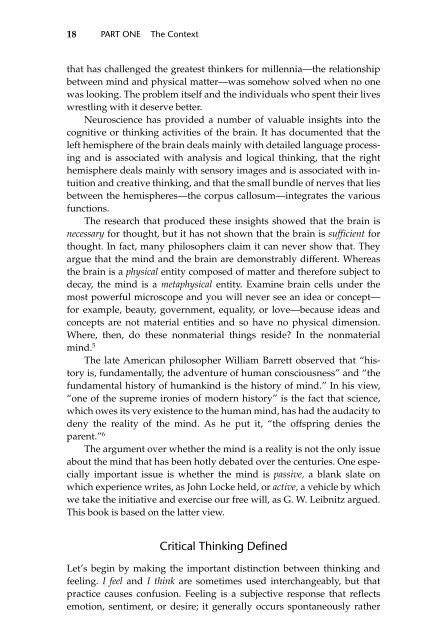Beyond Feelings
Beyond Feelings
Beyond Feelings
You also want an ePaper? Increase the reach of your titles
YUMPU automatically turns print PDFs into web optimized ePapers that Google loves.
18 PART ONE The Context<br />
that has challenged the greatest thinkers for millennia—the relationship<br />
between mind and physical matter—was somehow solved when no one<br />
was looking. The problem itself and the individuals who spent their lives<br />
wrestling with it deserve better.<br />
Neuroscience has provided a number of valuable insights into the<br />
cognitive or thinking activities of the brain. It has documented that the<br />
left hemisphere of the brain deals mainly with detailed language processing<br />
and is associated with analysis and logical thinking, that the right<br />
hemisphere deals mainly with sensory images and is associated with intuition<br />
and creative thinking, and that the small bundle of nerves that lies<br />
between the hemispheres—the corpus callosum—integrates the various<br />
functions.<br />
The research that produced these insights showed that the brain is<br />
necessary for thought, but it has not shown that the brain is sufficient for<br />
thought. In fact, many philosophers claim it can never show that. They<br />
argue that the mind and the brain are demonstrably different. Whereas<br />
the brain is a physical entity composed of matter and therefore subject to<br />
decay, the mind is a metaphysical entity. Examine brain cells under the<br />
most powerful microscope and you will never see an idea or concept—<br />
for example, beauty, government, equality, or love—because ideas and<br />
concepts are not material entities and so have no physical dimension.<br />
Where, then, do these nonmaterial things reside? In the nonmaterial<br />
mind. 5<br />
The late American philosopher William Barrett observed that “history<br />
is, fundamentally, the adventure of human consciousness” and “the<br />
fundamental history of humankind is the history of mind.” In his view,<br />
“one of the supreme ironies of modern history” is the fact that science,<br />
which owes its very existence to the human mind, has had the audacity to<br />
deny the reality of the mind. As he put it, “the offspring denies the<br />
parent.” 6<br />
The argument over whether the mind is a reality is not the only issue<br />
about the mind that has been hotly debated over the centuries. One especially<br />
important issue is whether the mind is passive, a blank slate on<br />
which experience writes, as John Locke held, or active, a vehicle by which<br />
we take the initiative and exercise our free will, as G. W. Leibnitz argued.<br />
This book is based on the latter view.<br />
Critical Thinking Defined<br />
Let’s begin by making the important distinction between thinking and<br />
feeling. I feel and I think are sometimes used interchangeably, but that<br />
practice causes confusion. Feeling is a subjective response that reflects<br />
emotion, sentiment, or desire; it generally occurs spontaneously rather


